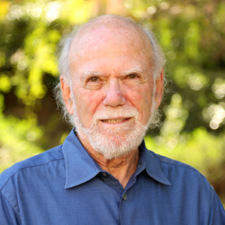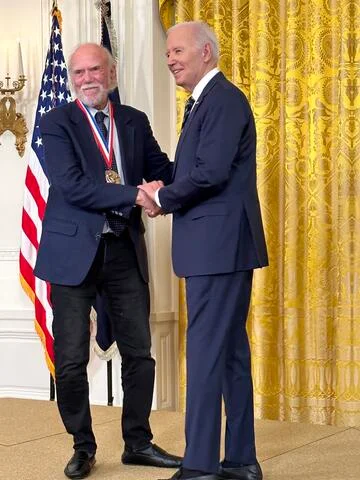A celebration honoring Nobel Laureate, Distinguished Professor, and Endowed Term Chair for Teaching, Research, and Service—Barry Barish—for being awarded the 2023 National Medal of Science
Tuesday, April 30, 2024
UC Riverside
900 University Avenue
Riverside, CA 92521
Citation for the National Medal of Science award: "For exemplary service to science, including groundbreaking research on sub-atomic particles. His leadership of the Laser Interferometer Gravitational-Wave Observatory led to the first detection of gravitational waves from merging black holes, confirming a key part of Einstein's Theory of Relativity. He has broadened our understanding of the universe and our Nation's sense of wonder and discovery."
Schedule of Events
1 p.m. Presentations on the Frontiers of Physics
Learn about research at the frontiers of physics being pursued by the Experimental Cosmology group that Professor Barish established at UCR.
Keynote speakers: Prof. Art McDonald, winner of the 2015 Nobel Prize, and Prof. Chang Kee Jung, winner of the APS 2022 Julius Edgar Lilienfeld Prize.
4 p.m. Physics department tours & poster presentations
Tour UCR's physics building, explore research labs & interact with faculty and students
5 p.m. Science Lecture Series reception
6 p.m. Gravitational Waves: Unraveling the Mysteries of our Universe with Barry Barish, Science Lecture Series
Photo Gallery
About Barry Barish
Barry Barish was awarded the 2017 Nobel Prize in Physics "for decisive contributions to the LIGO detector and the observation of gravitational waves". He shared the prize with American physicists Rainer Weiss and Kip S. Thorne.
The distinguished professor of physics and astronomy was also awarded the National Medal of Science in 2023. Established in 1959 by the U.S. Congress, the National Medal of Science is the highest recognition the nation can bestow on scientists and engineers.
Barish received his bachelor’s and doctorate in physics at the University of California, Berkeley, in 1957 and 1962, respectively. He was a research fellow at Berkeley from 1962 to 1963 and then became a research fellow at the California Institute of Technology (Caltech). He joined the faculty at the University of California, Riverside in 2018.
Barish began his career in high-energy physics. He worked on experiments at the Stanford Linear Accelerator Center and Fermilab, where he was among the first to observe the weak neutral current, a linchpin of the electroweak unification theories of Glashow, Salam, and Weinberg. In the 1980s he directed MACRO, an experiment that searched for exotic particles called magnetic monopoles and also studied penetrating cosmic rays, including neutrino measurements that provided important confirmatory evidence that neutrinos have mass and oscillate. He also headed a team to design an experiment for the Superconducting Super Collider (SSC), a giant particle accelerator to be built in Texas, but the U.S. Congress cancelled that project in 1993.
After the cancellation of the SSC, Barish became LIGO principal investigator in 1994. The National Science Foundation (NSF) in its 1992 and 1993 reviews of LIGO had expressed doubts about its feasibility and management structure. Barish instituted technical changes to LIGO’s design, such as using solid-state lasers, which were more powerful than the originally planned argon gas lasers. LIGO was run mainly as a small collaboration between Caltech and the Massachusetts Institute of Technology. Barish realized that LIGO would need permanent staff and many more scientists to help in what was an extremely technically demanding project. In 1997 he established the LIGO Scientific Collaboration (LSC), a team of hundreds of scientists from around the world. That same year Barish became LIGO director. Barish’s changes pleased the NSF, which funded LIGO at a much higher level, and were credited with doing much to make LIGO a success.
Construction began on LIGO’s two interferometers at Livingston, Louisiana, and Hanford, Washington, in 1994, and observations began in 2002. Although LIGO had not detected any gravity waves in its early years, Barish pushed through plans for an upgraded version, Advanced LIGO, that would. Advanced LIGO was approved by the NSF in 2004, and it was completely installed in 2014. On September 14, 2015, Advanced LIGO made the first detection of gravity waves from a pair of black holes that spiraled into each other 1.3 billion light-years away.
From 2005 to 2013 Barish was director of the Global Design Effort of the International Linear Collider (ILC), a proposed 31-kilometre- (19-mile-) long linear particle accelerator. The ILC is the highest priority future project for particle physics worldwide.
Barish joined the UCR faculty in 2018 with the rank of Distinguished Professor.



